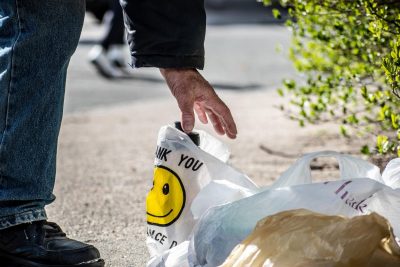Volunteers have completed more 4,500 errands for seniors in Boston, who are at a higher risk for coronavirus complications, as part of a City initiative.

The Good Neighbors program, created in April as a response to the pandemic, pairs seniors with volunteers who help purchase groceries, prepare food and deliver medication. Volunteers also engage in phone or written communication.
Jori Schwartz, a customer success advocate at Nesterly, a home-sharing service that partnered with the City on the project, said the program aims to help groups at risk for COVID-19.
“Good Neighbors was created by our team here at Nesterly to bring people together, out of safety for the community,” Schwartz said. “We support at-risk individuals who need to maintain social distancing.”
Nearly 1,000 residents have volunteered, filling requests in every Boston neighborhood, according to a Department of Neighborhood Development press release. Volunteers must pass a background check and follow safety protocols, including using personal protective equipment.
The service is completely free for seniors to use and is funded by the City, with most of the money paying for food, DND Deputy Director Kerry O’Brien said.
The City’s Age Strong Commission and Housing Innovation Lab also collaborated on the project, according to the press release.
Bostonians in need or someone on their behalf can submit a request to the Good Neighbors program by phone or via a form on Nesterly’s website.
Volunteers typically complete the tasks in one to three days. The program is also available in Louisville, Ky.
“We have seen the best of Boston with residents looking for ways to volunteer and support those in need,” Mayor Marty Walsh said in the press release. “I want to thank everyone who is volunteering to help others during these trying times.” About 11 percent of Bostonians are 65 and older, according to the U.S. Census Bureau.
O’Brien said volunteers tend to number at least 980 and can range upward of 1,000.
“It’s quite a force of them. They’re good people,” O’Brien said. “This is the best of humanity during a really trying time in Boston.”
Since March, Boston has seen nearly 20,000 cases and nearly 800 deaths as a result of COVID-19. Seven months after the initial outbreak, cases in Massachusetts are on the rise, with more than 150,000 cumulative cases as of Wednesday.
O’Brien said the partners plan to continue the program after the pandemic if possible.
Sara Faxon has led Nesterly’s growth initiatives and partnerships for about two years. She wrote in an email the response to the program has been “overwhelmingly positive,” but that occasionally, some requests cannot be completed because they are outside the program’s realm.
“Because we have a strong partnership with the City of Boston, we’re able to refer them to other resources and services that are better suited,” Faxon wrote. “We’ve built a platform that is flexible, easy to use and requires very little administration effort.”
Faxon wrote the program may extend into post-pandemic life, because the technology Good Neighbors employs are applicable to other potential programs.
“Because Good Neighbors matches volunteers with recipients quickly, the platform can be used for any volunteer-based initiatives,” Faxon wrote. “For example, a city initiative that connects volunteers with seniors looking for driveway snow-shoveling assistance in the winter.”


























































































































